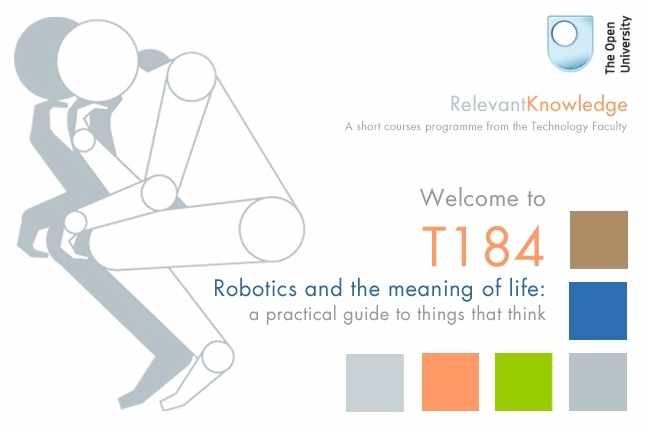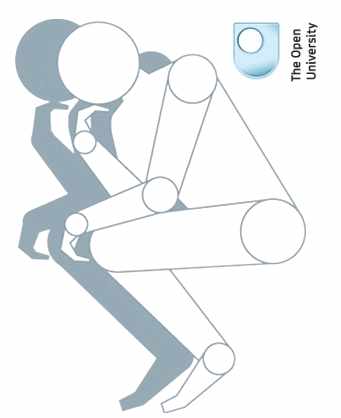| Last chance to enrol in OU's Robotics course |
| Written by Sue Gee | |||
| Sunday, 07 August 2011 | |||
|
The Open University's introductory level course, Robotics and the Meaning of Life, is accepting registrations for its final presentation. With mainly browser-based materials and online assessment it can be taken no matter where you are based. The increasing move to online delivery means that the UK-based Open University can now offer its courses to a world audience. T184: Robotics and the Meaning of Life is a 10-week course at Level 1 in an undergraduate degree program - but you can also take it as a standalone module.
There are two aspects to this course that make it stand out as being different. One is the reliance on I, Robot Isaac Asimov's collection of fictional stories, the other is that the practical labs give the option of using the Lego Mindstorms kit for some of its exercises. Students who join the course are provided with the Asimov book, which is the only "textbook" for the course but it doesn't supply Lego Mindstorms. If you don't have access to this kit, which is no longer manufactured and so not easily available, you can still participate fully in the practicals using a simulated robot buggy. Learning to control a robot programmatically is one of the key skills taught in this course. It isn't expected that students will already have programming skills but as this course packs a lot into a tight 10-week timetable having some familiarity with basic programming concepts in a help. On the other hand if are an experienced programmer the limitations and the idiosyncrasies of the proprietary language used can be a little frustrating. However the labs are an integral part of the course that add to the student's understanding of some of the practical difficulties of designing, building and controlling a robot. The course starts with a module that challenges you to reflect carefully on what a robot is. It uses an hour long documentary - a BBC television program presented by James May, which looks at the current state of robotics in 2008. Don't worry about it not being up to date as students are encouraged to use the web for start of the art examples and to contribute these to the course's own wiki. Students are expected to devote about 10 hours per week to the course equally divided between the theory, that is the web-based lessons which as well as pages of text use video clips and links to external articles, and the labs for which you'll need the course DVD. You are expected to work through the theory first which means that if time is tight it's the practical work that suffers. The Asimov stories are introduced in the second half of the course and there are five of them to read in total. One hint from our student reviewer is to get ahead on these before the course so as to avoid time pressure. It may seem like an odd idea to include science fiction in a university-level technology course but the rationale is to get students to reflect on Asimov's Three Laws of Robotics. Jon Rosewell, one of the course authors and its current Module Chair explained: Asimov's Laws provide useful thinking tools for reflecting on design considerations even if they can't be implemented and they give a focus for ethical implications. It is however worrying that you sometimes encounter them if they were real rather than fictional and I hope that students understand their limitations. To compete the course there are three assessments. Two are computer-marked quizzes which test your comprehension of the content of the course. The first of these comes at the mid-point and, helpfully, provides feedback before you embark on the second set of lessons. At the end of the course there's a similar test plus an assignment that is more open-ended and will be marked by members of the course team. You will find a choice of two questions to test your programming skills, one of which is based entirely on the simulated robot while the other uses the Lego Mindstorms kit. Finally you are asked to write a short article of around 400 words with a choice of two topics.
Although this is "distance learning" students are encouraged to contribute to online message boards, Forums, where as well as exchanging ideas with each other they can ask questions and get feedback from tutors and members of the course team. Not everybody joins in the forums, although I imagine there are quite a few passive listeners, but they contribute to a lively, thought-provoking and cutting edge experience. There are no plans for a replacement for this course, which does seem regrettable at a time when robotics is such an important technology. Jon Rosewell hopes that some elements of it, or at least some robotics content, may be incorporated into future courses. If you want to participate in the final presentation sign up for T184 before September 24, 2011. Also of interest:A degree with real world relevance Gain Linux Certification via online study Get your AI certificate online and for free
If you would like to be informed about new articles on I Programmer you can either follow us on Twitter or Facebook or you can subscribe to our weekly newsletter.
|
|||
| Last Updated ( Monday, 08 August 2011 ) |



